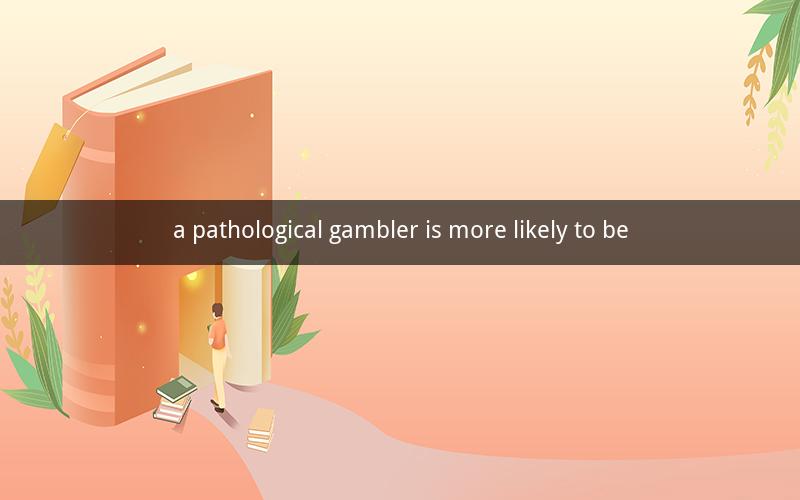
Table of Contents
1. Introduction to Pathological Gambling
2. Risk Factors for Pathological Gambling
3. Psychological Aspects of Pathological Gambling
4. Social and Environmental Influences
5. The Impact of Pathological Gambling on Relationships
6. Treatment and Support for Pathological Gamblers
7. Prevention and Education
8. Conclusion
---
1. Introduction to Pathological Gambling
Pathological gambling, also known as compulsive gambling, is a mental health disorder characterized by an uncontrollable urge to gamble, despite negative consequences. It is classified as an addictive behavior, similar to substance abuse disorders. A pathological gambler is more likely to be affected by various factors, including genetics, environment, and personal vulnerabilities.
2. Risk Factors for Pathological Gambling
Several risk factors contribute to the development of pathological gambling. These include:
- Genetic Factors: Research suggests that a genetic predisposition may play a role in the development of pathological gambling.
- Psychological Factors: Individuals with certain personality traits, such as impulsivity and a need for excitement, may be more susceptible to developing a gambling problem.
- Environmental Factors: Easy access to gambling opportunities, exposure to gambling in the family, and cultural influences can all increase the risk.
3. Psychological Aspects of Pathological Gambling
The psychological aspects of pathological gambling are complex. These include:
- Cognitive Biases: Pathological gamblers often exhibit cognitive biases, such as overestimating their chances of winning and underestimating the potential for negative outcomes.
- Emotional Regulation:Gambling can serve as a coping mechanism for emotional distress, leading to a reliance on this behavior to regulate feelings.
- Mood Swings:Gambling can cause intense mood swings, from euphoria during winning streaks to despair during losing periods.
4. Social and Environmental Influences
Social and environmental factors can significantly impact a person's likelihood of developing a gambling problem. These include:
- Social Support:Lack of social support and a strong network of friends and family can increase the risk of gambling problems.
- Cultural Attitudes:Societal attitudes towards gambling can influence an individual's likelihood of developing a problem.
- Marketing and Advertising:The aggressive marketing and advertising of gambling can make it more accessible and appealing to vulnerable individuals.
5. The Impact of Pathological Gambling on Relationships
Pathological gambling can have a devastating impact on personal relationships, including:
- Financial Strain:Gambling debts can lead to significant financial strain, causing stress and conflict within relationships.
- Trust Issues:Lies and deception related to gambling can erode trust between partners and family members.
- Emotional Distress:The emotional distress caused by gambling can lead to increased tension and conflict within relationships.
6. Treatment and Support for Pathological Gamblers
Treatment for pathological gambling often involves a combination of therapy and support groups. These may include:
- Cognitive Behavioral Therapy (CBT):CBT helps individuals identify and change negative thought patterns and behaviors related to gambling.
- Support Groups:Support groups such as Gamblers Anonymous provide a community of individuals who share similar experiences and can offer mutual support.
- Medication:In some cases, medication may be used to help manage symptoms of depression or anxiety associated with gambling.
7. Prevention and Education
Preventing pathological gambling involves education and awareness. This includes:
- Education on the Risks:Educating the public about the risks and consequences of gambling can help prevent problem gambling.
- Community Programs:Community programs that promote healthy lifestyles and provide alternatives to gambling can be effective in reducing the prevalence of gambling problems.
- Responsible Gambling Campaigns:Campaigns that encourage responsible gambling behaviors can help reduce the risk of developing a gambling problem.
8. Conclusion
A pathological gambler is more likely to be affected by a combination of genetic, psychological, social, and environmental factors. Understanding these factors can help in the development of effective prevention and treatment strategies. By promoting education, awareness, and support, we can work towards reducing the prevalence and impact of pathological gambling.
---
Questions and Answers
1. Q: What is the difference between problem gambling and pathological gambling?
A: Problem gambling refers to any gambling behavior that causes distress or harm, while pathological gambling is a severe form of problem gambling characterized by compulsive gambling behavior.
2. Q: Can someone develop a gambling problem without any risk factors?
A: While risk factors can increase the likelihood of developing a gambling problem, it is possible for someone without risk factors to develop a gambling addiction.
3. Q: Is there a cure for pathological gambling?
A: There is no single cure for pathological gambling, but with effective treatment and support, individuals can manage and reduce their gambling behavior.
4. Q: How common is pathological gambling?
A: The prevalence of pathological gambling varies by country and region, but it is estimated to affect approximately 1-2% of the general population.
5. Q: Can pathological gambling be hereditary?
A: Some research suggests that there may be a genetic component to pathological gambling, indicating that it could be hereditary in some cases.
6. Q: Is it possible to overcome a gambling addiction on one's own?
A: While it is possible for some individuals to overcome a gambling addiction independently, most find that seeking professional help and joining support groups are more effective.
7. Q: How can I recognize the signs of a gambling problem in a loved one?
A: Signs may include hiding gambling activities, lying about gambling behavior, neglecting responsibilities, and experiencing financial, emotional, or social difficulties due to gambling.
8. Q: Are there any legal consequences for pathological gamblers?
A: Legal consequences can vary depending on the severity of the gambling behavior and the laws of the jurisdiction. In some cases, individuals may face fines or imprisonment for gambling-related crimes.
9. Q: Can gambling addiction be treated with medication?
A: While medication is not a primary treatment for gambling addiction, it may be used in conjunction with therapy to manage symptoms of underlying conditions, such as depression or anxiety.
10. Q: What is the most effective treatment for pathological gambling?
A: The most effective treatment for pathological gambling typically involves a combination of cognitive behavioral therapy, support groups, and, in some cases, medication to manage co-occurring conditions.